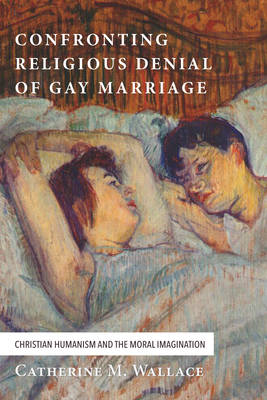
Door een staking bij bpost kan je online bestelling op dit moment iets langer onderweg zijn dan voorzien. Dringend iets nodig? Onze winkels ontvangen jou met open armen!
- Afhalen na 1 uur in een winkel met voorraad
- Gratis thuislevering in België vanaf € 30
- Ruim aanbod met 7 miljoen producten
Door een staking bij bpost kan je online bestelling op dit moment iets langer onderweg zijn dan voorzien. Dringend iets nodig? Onze winkels ontvangen jou met open armen!
- Afhalen na 1 uur in een winkel met voorraad
- Gratis thuislevering in België vanaf € 30
- Ruim aanbod met 7 miljoen producten
Zoeken
Omschrijving
Writing in part for secular humanists, non-Christians, and ex-Christians, Wallace locates the beginning of religious vilification of LBGTQ Americans: these attacks recycle earlier, equally reactionary political opposition to racial desegregation and equal rights for women. Then, step by step, she lays out three major flaws in the religious argument against gay marriage. First, it derives from Plato and Greco-Roman sexual anxieties, not from Jesus. Second, opposition to gay marriage takes Bible verses out of context, ignoring their roots in Iron Age biology, sexual politics in the classic era, and pagan ritual practices. Third and most importantly, this opposition reflects an inadequate moral theology based on a denial of contemporary science and social science. Then and only then does she offer her own concept of marriage as a morally rooted, creative process, laying out common ground easily shared by Christian humanists and secular humanists alike. Her nimble, accessible account, richly leavened by personal stories, will facilitate new conversations and alliances among all those, believers and nonbelievers alike, who affirm the moral dignity of gay marriage.
Specificaties
Betrokkenen
- Auteur(s):
- Uitgeverij:
Inhoud
- Aantal bladzijden:
- 108
- Taal:
- Engels
- Reeks:
- Reeksnummer:
- nr. 1
Eigenschappen
- Productcode (EAN):
- 9781498225427
- Verschijningsdatum:
- 27/10/2015
- Uitvoering:
- Hardcover
- Formaat:
- Genaaid
- Afmetingen:
- 140 mm x 216 mm
- Gewicht:
- 276 g

Alleen bij Standaard Boekhandel
+ 105 punten op je klantenkaart van Standaard Boekhandel
Beoordelingen
We publiceren alleen reviews die voldoen aan de voorwaarden voor reviews. Bekijk onze voorwaarden voor reviews.











